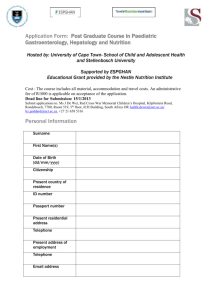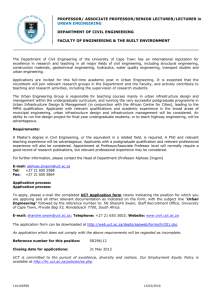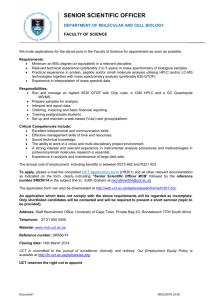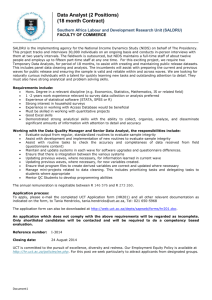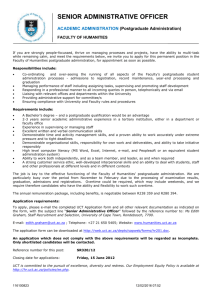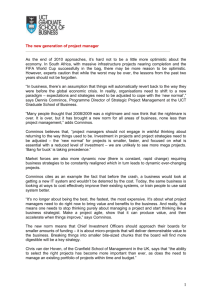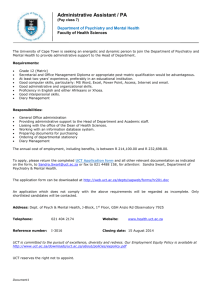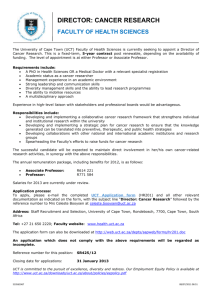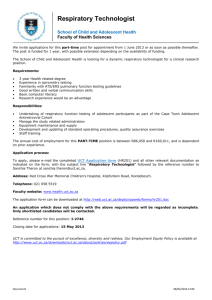UCT Research Strategy - Research Office
advertisement
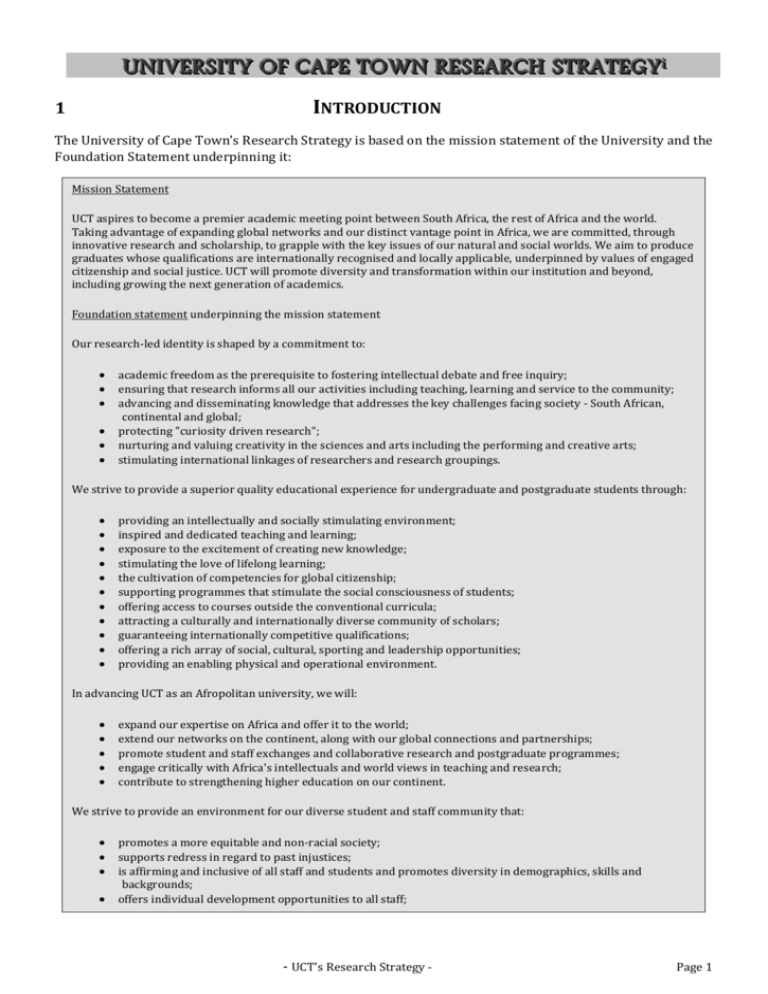
U UN NIIV VEERRSSIITTYY O OFF C CAAPPEE TTO OW WN N RREESSEEAARRC CH H SSTTRRAATTEEG GYYii INTRODUCTION 1 The University of Cape Town’s Research Strategy is based on the mission statement of the University and the Foundation Statement underpinning it: Mission Statement UCT aspires to become a premier academic meeting point between South Africa, the rest of Africa and the world. Taking advantage of expanding global networks and our distinct vantage point in Africa, we are committed, through innovative research and scholarship, to grapple with the key issues of our natural and social worlds. We aim to produce graduates whose qualifications are internationally recognised and locally applicable, underpinned by values of engaged citizenship and social justice. UCT will promote diversity and transformation within our institution and beyond, including growing the next generation of academics. Foundation statement underpinning the mission statement Our research-led identity is shaped by a commitment to: academic freedom as the prerequisite to fostering intellectual debate and free inquiry; ensuring that research informs all our activities including teaching, learning and service to the community; advancing and disseminating knowledge that addresses the key challenges facing society - South African, continental and global; protecting "curiosity driven research"; nurturing and valuing creativity in the sciences and arts including the performing and creative arts; stimulating international linkages of researchers and research groupings. We strive to provide a superior quality educational experience for undergraduate and postgraduate students through: providing an intellectually and socially stimulating environment; inspired and dedicated teaching and learning; exposure to the excitement of creating new knowledge; stimulating the love of lifelong learning; the cultivation of competencies for global citizenship; supporting programmes that stimulate the social consciousness of students; offering access to courses outside the conventional curricula; attracting a culturally and internationally diverse community of scholars; guaranteeing internationally competitive qualifications; offering a rich array of social, cultural, sporting and leadership opportunities; providing an enabling physical and operational environment. In advancing UCT as an Afropolitan university, we will: expand our expertise on Africa and offer it to the world; extend our networks on the continent, along with our global connections and partnerships; promote student and staff exchanges and collaborative research and postgraduate programmes; engage critically with Africa's intellectuals and world views in teaching and research; contribute to strengthening higher education on our continent. We strive to provide an environment for our diverse student and staff community that: promotes a more equitable and non-racial society; supports redress in regard to past injustices; is affirming and inclusive of all staff and students and promotes diversity in demographics, skills and backgrounds; offers individual development opportunities to all staff; is welcoming as a meeting space for scholars from Africa and around the world. - UCT’s Research Strategy - Page 1 UCT’s Research Strategy aims to give substance to the vision of UCT as a research-led University; in particular to develop a set of strategic objectives that will promote research-oriented scholarship and teaching, will lead to appropriate reward systems, and will generally enhance UCT's global competitiveness. 2 INVESTMENT IN RESEARCH Research is a long-term investment in the future, and the relationship between input and outcome is not necessarily linear and neither is it short-term. We therefore recognise that the cost of producing world class, internationally competitive research must proactively be prioritised in the University’s overall planning and budgeting process. Beyond direct costs, there are the costs associated with developing and maintaining a research infrastructure and the sustainability of certain formative disciplines such as Mathematics and Languages. 3 QUALITY IMPERATIVE All research endeavours at the University are quality-driven. Our management systems demonstrate this through consistent emphasis on peer-evaluation, as reflected in: Peer-evaluation as a key component in our internal research funding programmes; The peer screening mechanisms to enhance the quality of our agency funding and rating applications; The cyclical peer-review of all accredited research groupings (see Review of Research Groups under the section Quality Assurance for Research); The foregrounding of peer-reviewed research publications in our annual Research Reports; The recognition awarded to NRF-rated researchers, who by definition, are ranked according to their peer-evaluated status; The external examination of postgraduate dissertations; The ongoing self-evaluation of our research management systems through the University and Faculty Research Committees. 4 4.1 TRANSFORMATION IMPERATIVE Funding opportunities Research as a vehicle for transformation is manifest in the University’s internal funding framework, which caters for researchers at different levels of their research careers and responds to a variety of developmental needs. Funding categories include support for postgraduate studies; new appointees (Start-up grants); emerging researchers who still have to develop a career track (Research Development grants); curiositydriven research as well as strategically selected focus areas (Block grants e.g. to Signature Themes); innovative collaborative projects that explore new terrain and stimulate a novel approach (Stimulation Awards e.g. those linked to the Programme for the Enhancement of Research Capacity) and funds to attend conferences, host conferences or to bring visiting scholars of repute to the University. 4.2 Growing the next generation of academics The UCT Framework for Research Development is geared at playing a transformative role, with the Emerging Researcher Programme (ERP) specifically catering for academics who are not yet established researchers. The ERP uses current and retired professors to offer group and individual mentoring and a range of seminars and workshops designed to support emerging researchers to complete their doctoral degrees, publish in appropriate international journals, acquire NRF rating and raise research funds through successful funding proposals. The ERP offers its own Research Development Grants as well as advising - UCT’s Research Strategy - Page 2 researchers how to develop applications for funding from other sources. A main objective of this ongoing series of interventions is to develop the next generation of research leaders and to grow and transform the current demographic profile of active researchers. On exiting from the ERP, researchers are not left in a vacuum but continue to receive support through the Programme for the Enhancement of Research Capacity (PERC), which offers a range of initiatives, including mentoring, seminars and workshops, for mid-career researchers. PERC also provides grants for Africa-centred, interdisciplinary research. The Supervision Training Programme is open to all academic staff, whether they are supervising postgraduate students for the first time or whether they are seasoned academics who wish to update and hone their supervision skills. The Mellon Visiting and Retired Scholars Mentorship Programme draws on the expertise of senior (visiting or retired) scholars and introduces them into fixed term mentoring relationships with junior staff, based on case by case agreements that specify objectives to be achieved within certain periods of time. All levels of researchers are also supported by other structures based in the Research Office, particularly with regard to obtaining funds for their research. Where applicable, Research Contracts and Intellectual Property Services (RCIPS) provide specialised support for the commercialisation of research outputs. In addition, and together with the Carnegie Corporation, we have embarked on a programme of ‘growing the next generation of academics” which involves training and retaining people for academia in and for Africa. Launched through the provision of a substantial number of doctoral and postdoctoral fellowships in areas where it is a particular challenge to retain scholars for academia, this programme is part of our commitment to strengthen higher education on our continent and is integral to our desire to ensure that UCT is a place that attracts a culturally and internationally diverse community of scholars. This approach helps to create a more equitable and non-racial society that is affirming and inclusive of all staff and students and promotes diversity in demographics, skills and backgrounds. 5 IMPACT: THE MEASURE OF EXCELLENCE The designation ‘research-led’ signifies that we accept the obligation of being one of the core sites in South Africa that aims to make the country competitive in the global knowledge economy and to educate its future leaders. To be such a university presupposes firstly that the quality of its research must be excellent, as measured by its impact and, secondly, that research informs everything that relates to the university’s core business, namely teaching and socially responsive work. In keeping with UCT’s revised mission and particularly in view of strategic goal 4 (“A Vision for development of research at UCT: greater impact and greater engagement”) adopted by Council in December 2009, the strategy has two main foci for the period of 2010 to 2014, namely the improvement of (a) the impact and (b) the level of engagement of our research. While recognising the limitations of bibliometric measures of impact and the need to avoid reducing research excellence to simple measures of impact, we acknowledge the strategic importance of these measures, as the basis upon which global and national university rankings are made. In order to have greater impact we aim to concentrate on four aspects of our research, namely its (a) focus, (b) level of internationalisation, (c) visibility, and (d) support levels, including support along the full innovation chain in respect of inventions and other research outputs with marketable possibilities. 5.1 Increased focus Successful research occurs where an institution focuses its money and effort into those things that it does really well. Our signature themes, our system of accrediting research groupings, our set of SARChI chairs, and our participation in networks and initiatives that span different universities are all examples of how focus can successfully enhance the quality of research. It has now become necessary to create even greater focus in all sectors of the university’s research effort by giving increased support to the above mentioned instruments of focus and to identify new ones that need to be brought into being. - UCT’s Research Strategy - Page 3 Focus in UCT’s research effort is informed by ongoing scans of the university’s strengths and weaknesses as well as external policies and the national and international funding landscape. This dynamic environment as well as South Africa’s response to global and local challenges is constantly monitored to identify synergies that directly inform the selection of priority areas. It is accepted that these priorities may change over time but in each case the institutional focus serves as a launching pad to make such initiatives self-sustainable. To select areas and research themes for support that show up on UCT’s radar screen through this methodology, the university considers feasibility in relation to strengths and weaknesses. Motivations and implementation plans are then solicited from the relevant Faculties and rigorously screened by a panel of senior academics, deans and deputy vice chancellors. Added to this is a deliberate strategy to recruit and retain academics of the highest possible excellence that through their leadership can take a strategically selected area to the next level of local engagement and international competitiveness. 5.2 Increased internationalisation A common denominator of successful universities – both in the developed and the developing world – is that they place great store by being internationally connected, not only by having an appreciable percentage of international staff and students, but also by linking their research efforts internationally. We are therefore committed to new levels of targeted international research co-operation and to stimulate the international linkage of researchers and research groupings that have little or no international contact and/or partners. Specifically, we seek to increase the impact of interdisciplinary collaboration by fostering African linkages that assert our common location in Africa, thereby strengthening global competitiveness through the vantage point of collaborative perspectives from the global South. 5.3 Increased visibility The more our research is visible, the greater its impact will be. We are committed to maximising the use of ICT tools to make UCT’s research available as widely as possible and to give UCT researchers optimal access to electronically available research and research tools. This includes making PhD theses and other appropriate publications digitally available through the Open UCT initiative and creating an interactive Research Portal. 5.4 Increased support Support takes various forms: providing assistance to apply for funds and rating; making available sufficient funds for research; having programmes that develop new and mid-career researchers; ensuring that research time is not unnecessarily eroded by inadequate planning; smoothing the passage of postdoctoral research fellows when taking up their positions; ensuring a good experience for postgraduate students and postdoctoral fellows; facilitating the conclusion of research contracts as well as the protection and exploitation of intellectual property. In this regard it is vitally important that we build on the advances made in the recent past to bring our support for technology transfer to a truly international level. The university therefore constantly reviews its current support arrangements to ensure delivery on all three requirements at an optimal level; and takes cognisance of the fact that different types of researchers have different needs. 6 ENGAGEMENT: MAKING RESEARCH RELEVANT TO TEACHING AND SOCIALLY RESPONSIVE WORK Our research must engage (a) our students and (b) the community in our city, region and continent. We are committed to ensuring that our students are exposed to the benefits of the research done at the University and, secondly, we seek to extend those benefits to the community within which we operate. We consider it to be especially appropriate for a university in a developing country to earn the respect of the community that it serves by making a difference to the problems faced by the community – and therefore research that is of relevance to the community is strongly supported including initiatives such as the “Knowledge Co-Op” (Science Shop.) Equally pertinent are modes of civic engagement that aim to popularise new ideas generated by academics and animate critical public debate on key issues of the day. This is one of the key ways in which universities bolster the democratic project. - UCT’s Research Strategy - Page 4 6.1 Bringing research into teaching To be a research-led university, our research must inform our teaching. All UCT students must experience the importance of creating new knowledge by virtue of the fact that their teachers infuse their courses with the results of their research. We must multiply the incentives for research to be fed into all levels of teaching and for encouraging research by all students. In this regard it is important to revisit the documents on the linkage between research and teaching that have been developed in UCT in the recent past, in order to develop a comprehensive strategy for integrating research into teaching. 6.2 Bringing research into the community: Being Afropolitan We believe that UCT should be a model of a developing-world university – a brilliant example of what such a university can and should do. Such a university looks to both the world and its own country and continent to identify its tasks and challenges; it combines excellent research (for that is the key to South Africa’s and the African continent’s future) with a commitment to do research that improves the condition of the people of the country and continent and to unlock their potential. For instance, space research can be done both to understand the evolution of the universe and to help manage, through satellite technology, our ever-growing cities as well as the problems of food and water security, urbanisation and transport; cutting-edge biotechnology can curb disease, assist in pollution-control and industrial and commercial development through bio-catalysts; the sociological analysis of African economic phenomena can assist in the development of our continent, at the same time as contributing to wider global debates about poverty and inequality, gender and work, formal and informal markets etc; the study of South African constitutionalism offers the possibility of creating a hub for research into good governance for the country, and the continent as a whole – at the same time as shaping more international debates and practices of constitution-making. These are just some examples of the social innovation that must be encouraged at UCT; research that is focused on being world-class and doing what is relevant in a developing country. 6.3 Innovation In respect of social innovation, a cohesive and strongly networked innovation support system is a prerequisite for deriving the wider economic and social benefits of research and achieving alignment of the wide range of stakeholders in order to overcome the so-called ‘chasm’ in the innovation chain. UCT’s Research Contracts and Intellectual Property Services plays a facilitative role in mobilizing stakeholders to action and to be imbedded within a local and national economic development framework – hence the university’s commitment to extensive relationship-building with national research councils and advisory bodies as well as with government departments and both public and private sector economic development entities. The UCT Innovation Working Group has defined innovation as “the creation and successful implementation of new ideas and inventions that make a real difference through the generation of tangible outcomes with social and / or financial value”. This definition seeks to include the notion of social innovation – an area that is gaining increasing traction. UCT seeks to maximise opportunities whereby new knowledge can be applied for social and economic benefit. As part of this process, our quality-driven imperative is exemplified by the professional support provided for the protection of intellectual property and the commercialisation of research outputs. An integrated and focused strategy for innovation is being developed in light of the government’s acknowledgement of the strategic value of intellectual property, evident through the promulgation of the Intellectual Property Rights from Publically Financed Research Act and the Technology Innovation Agency Act. 7 CONCLUSION The University of Cape Town’s Research Strategy is reviewed on an ongoing basis and continually assessed against changes in the external as well as internal research environment. The Department of Research & Innovation’s information management system is benchmarked in relation to international good practice and informs such changes by tracking trends and changes in performance. Subsequent proposals for change or innovation to the University Research Strategy are formally routed from the University Strategy Committee - UCT’s Research Strategy - Page 5 and/or the annual Research Indaba1 to the University Research Committee and from there, to the Senate Executive Committee and Council. Updated to reflect the new mission statement and strategic goal 4: “a Vision for development of research at UCT: greater impact and greater engagement” as adopted by Council in December 2009). i The annual Research Indaba is attended by the full University Research Committee, the full Faculty Research Committees and the Deans, and is chaired by the Deputy Vice Chancellor (Research). 1 - UCT’s Research Strategy - Page 6
